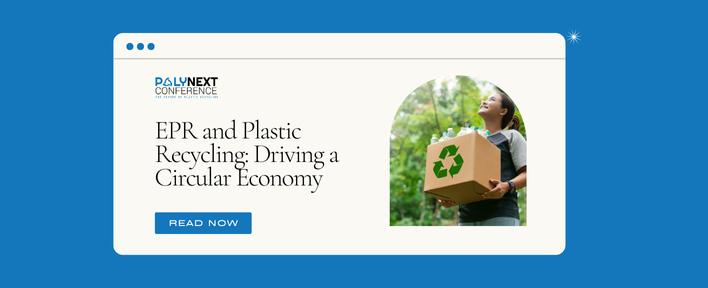Discover 2025’s breakthroughs in plastic recycling, circular economy growth, and insights from PolyNext 2025 Dubai. Plastic waste is no longer just a problem—it’s rapidly becoming a resource for innovation, green jobs, and sustainable growth. Plastic recycling technologies are accelerating in 2025, spurred by groundbreaking innovations, global policy shifts, and major industry events such as the upcoming PolyNext 2025 Conference in Dubai.
Breakthroughs in Plastic Recycling
New scientific advances are reshaping plastic recycling. Northwestern University has developed a revolutionary method that uses ambient air moisture to break down PET plastics cleanly and efficiently, converting waste back into monomers for high-quality reuse and upcycling. At the same time, AI-assisted sorting and solvent-based recycling are improving the handling of mixed plastic waste—reducing contamination, lowering energy use, and increasing the purity of recyclates. These advances are reshaping the possibilities for closing the plastic loop.
Circular Economy: Global Momentum
The circular economy is gaining strong policy and investment support worldwide. The market grew by 7.5% last year and is projected to expand by 25.65% annually in North America through 2031. Europe is leading with new directives on recyclable packaging, repair rights, and incentives for secondary materials. Globally, the sector already employs 2.2 million people, with India projected to add 10 million new jobs by 2050. By prioritizing repair, reuse, and recycling, circular economy models are reducing waste, tackling resource scarcity, and helping decouple growth from raw material extraction.
PolyNext 2025: Driving Industry Collaboration and Excellence
PolyNext 2025, taking place in Dubai, serves as a global hub for plastic recycling and circular economy solutions. The event will showcase new recycling technologies, host discussions on policy and industry strategies, and recognize leaders advancing sustainability. With participation from major companies like Unilever, Emirates Biotech, Earth5R, Revalyu, and Zeloop, as well as international experts, the conference is set to drive collaboration and highlight innovations ready to scale worldwide.
These innovations and collaborative efforts are not just academic or corporate exercises -they are shaping a rapidly expanding market ,creating investment opportunities , and supporting new green jobs worldwide.
Market Growth and Investment Outlook
According to recent forecasts, the global circular economy market was valued between USD 638–656 billion in 2024, depending on source, and is projected to reach between USD 2.2–2.66 trillion by 2034-2035, showing a solid CAGR in the 13-14% range. (Sources:Spherical Insights; Zion Market Research)
Regionally, North America is expected to grow especially fast, with projections of a 25.65% CAGR from 2024 through 2031. (StartUs Insights)
The digital circular economy segment is also emerging as a high-growth area: its market size is forecast at USD 4.28 billion in 2025, with growth to USD 11.9 billion by 2030, representing a CAGR of approximately 22-23%. (Mordor Intelligence)
Employment Projections
The circular economy already supports 2.2 million jobs worldwide, with 125,000 added last year alone. The International Labour Organization projects up to six million new green jobs globally, while India alone could generate 10 million jobs by 2050 in recycling and resource recovery sectors.
Innovation and Sector Trends
Innovation underpins the sector’s momentum, with more than 41,000 patents and 4,700 grants recorded to date. Growth areas include AI-based sorting of materials, digital product tracking platforms, and advanced recycling for plastics, textiles, and even solar panels. Leading hubs include the USA, UK, Germany, India, and Italy, with cities such as London, New York, and Singapore driving global deployment.
Conclusion
With new breakthroughs in plastic recycling and surging momentum for circular economy practices, 2025 marks a turning point for sustainable industry. Events like PolyNext 2025 are not only showcasing innovations but also fostering collaboration across borders. Together, these advances are shaping a future where materials are continuously reused, pollution is drastically reduced, and the circular economy becomes a cornerstone of global growth.



